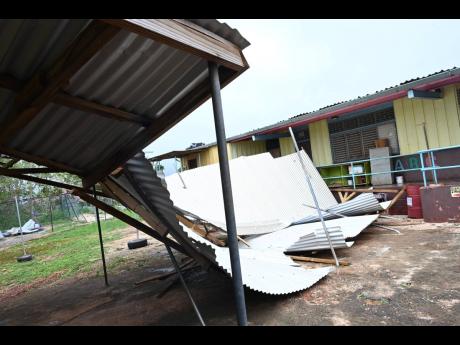Editorial | Keep schools open
A happy development is that both Fayval Williams, the education minister, and Nigel Clarke, at finance, have listed repairing schools among the priorities in the Government’s post-Beryl recovery efforts.
What we have not heard is where educational institutions rank on that list, and what are the strategies to ensure that all students and teachers have functional facilities to use at the start of the new school year in a mere six weeks. This is not a matter for which there is a last-minute scramble to find spaces for marooned students. For Jamaica can ill-afford further disruptions in the delivery of education to its children.
Which not only makes a clearly defined and transparent recovery plan crucial, but urgent. Any such strategy can only benefit from the early involvement of all education stakeholders, especially parents.
It is three weeks since Beryl passed off Jamaica’s southern coast, side-swiping the island, leaving significant damage, especially in the south central and south western portions. There have been no public updates since then, but a week ago Education Minister Williams reported that of 309 schools already assessed, 85, or approximately 28 per cent of them, were severely damaged. The bill for repairing the severely damaged schools was J$1.42 billion, or 53 per cent of the estimated J$2.7-billion cost for fixing all schools assessed up to then.
This is important on three counts. One is the short time frame until schools are supposed to reopen in the first week of September. So the authorities face a crunch between having the institutions ready, or finding alternative spaces for teaching and learning.
Second, given that a week ago only around a third of all public schools had been assessed, the overall repair bill will inevitably rise. Indeed, that will happen even if the overall number of damaged schools remains the same. Some, on review, will be found to be more severely damaged than initially thought.
MARSHAL RESOURCES
Allied with that is the short time until the start of the new academic year and the Government’s ability to marshal the resources to repair the hurricane damage, which, preliminarily, has been estimated at around J$45 billion.
Finance Minister Clarke, if this newspaper understands him correctly, has suggested that he will have around J$10.9 billion to spend on post-Beryl reconstruction during the next eight months of the fiscal year. That is unless he borrows, which he is disinclined to do.
Of the funds already identified by the minister, around J$5 billion will come from internal contingency accounts and disaster insurance. The rest will be provided by external donors and rearranging some planned spending for the current fiscal year. In other words, fiscal constraints, tight time frames and absorptive capacity will mean that the bulk of the recovery programme will spill over into the new financial year.
If Minister Williams could wrangle the repairing of all the early-identified worst-hit schools during this fiscal year, it would consume 11 per cent of Dr Clarke’s recovery/repair budget. Put another way, time and cost will likely mitigate against completing the fix of anywhere near the majority of the damaged schools, either before they reopen, or during this fiscal year.
That notwithstanding, the education ministry must find ways to have all students and their teachers back into functional classrooms in the first week of September.
ALREADY WORKING
The ministry’s technocrats, school boards and principals should already be working at this. Or, rather, they should merely be dusting off existing contingency plans, which should have been long in place for hurricanes and other catastrophes.
There are profoundly good reasons why no Jamaican administration should want the island’s children out of school for an extended period. For a long stretch when the COVID-19 pandemic caused schools to shutter, the education ministry could not account for 120,000 students – a fifth of the enrolled primary and secondary cohort – although they should have been logged into online classes.
Further, in the first 19 months of the school closures, UNICEF, the United Nations children’s agency, estimated that Jamaican students, combined, lost 1.3 billion hours of class time.
That was in a context where Jamaican students, despite completing 11.7 years of schooling, were already estimated to achieve only 7.2 years of learning when compared to the world’s best-performing education systems.
Jamaican students, in that sense, have a deficit of 4.5 years on their best global peers. This shows in the 40 per cent of students who complete primary education without reading or doing maths at their age/grade level, and the fact that less than 30 per cent of students who write the Caribbean Examinations Council’s Caribbean Secondary Education Certificate pass five subjects, including maths and English, in a single sitting.
The bottom line: while the Government undertakes the systematic repair of the education system, ways have to be found to get, and keep, students in classrooms, even after they are damaged by hurricanes. How that is to be done in the current scenario, Minister Williams must say.

